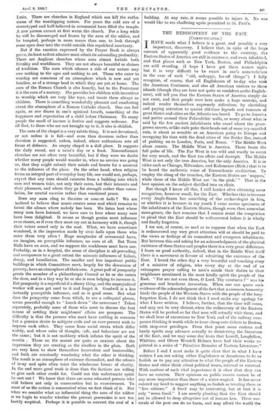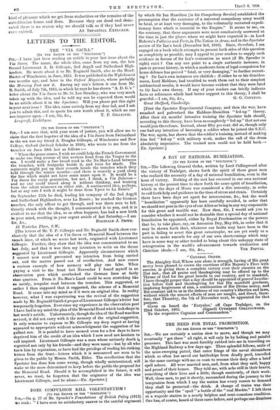THE REDISCOVERY OF THE EAST.
[CODDIUNICATED.]
T HAVE made what I believe is a great, and possibly a very I_ important, discovery. I believe that, in spite of the large amount of apparently good evidence to the contrary, the Eastern States of America are still in existence, and even inhabited, and that places such as New York, Boston, and Philadelphia are still standing. (I hope I have got these names right. but it is very difficult to be exact in one's nomenclature in the case of such "old, unhappy, far-off things.") I fully recognize, of course, that all Englishmen of to-day who visit tho American Continent, and also all American visitors to these islands (though they arc here not quite so confident as the English- men), will tell you that the Eastern States of America simply do not exist, and that people over here make a huge mistake, and indeed render themselves supremely ridiculous, by cherishing and paying attention to quaint old-time legends and rumours of great States and cities on tho Atlantic sea-board. To go to America and potter around their Palaeolithic walls, or worry about what is said by the few ancient inhabitants who crawl about the grass- grown streets, orlike owls poke their heads out of some ivy-mantled ruin, is about as sensible as an American going to Europe and occupying his time with the dead cities of the Zuider Zee, instead of pushing on to London, Paris, and Rome. "The Middle West alone counts. The Middle West is America. There beats the full pulse of life. The Far West is too wild and woolly to count for very much, and the East too effete and decrepit. The Middle West is not only the true America, but the only America. It is in cities such as Chicago, Milwaukee, and Kalamazoo (Mich.) that is to be heard the authentic voice of Transatlantic civilization. To employ the slang of the trenches, the Eastern States are nappoo,' while those of the Middle West arc 'in the pink.'" That is the best opinion on the subject distilled into an elixir.
But though I know all this, I still hanker after obtaining some recognition, however small, for the East. Whether this is because every Anglo-Saxon has something of the archaeologist in him. or whether it is because in my youth I came across specimens of the inhabitants of the Eastern States, though even then somewhat moss-grown, the fact remains that I cannot resist the tomptatioa to plead that the East should be rediscovered before it is wholly and finally forgotten.
I am not, of course, so mad as to suppose that when the East is rediscovered any very great attention will or should be paid to the views or feelings of its somnolent and evergreen inhabitants. But between this and asking for an acknowledgment of the physical existence of these States and peoples there is a very great difference. I learn on good authority, indeed, that in the Middle West itself there is a movement in favour of admitting the existence of the East. I heard the other day a very beautiful and touching story of a minister of religion, who every day at the end of an extempore prayer calling to men's minds their duties to their neighbours mentioned in the most kindly spirit the people of the East. "For arc not even those, 0 Lord, Thy creatures ? " was his generous and beneficent invocation. When one can quote such evidence of the acknowledgment of the fact that a common humanity
binds the people of the Western States with the people of the long- forgotten East, I do not think that I need make any apology for what I have written. I believe, further, that the time will come, and may not be very distant, when the rediscovery of the Eastern States will be pushed so far that men will actually visit them, and we shall hear of excursions to New York and of the railway com- panies thinking it worth while to issue cheap-rate tickets to Boston, with stop-over privileges. From that point some curious and hardy spirits may advance actually to disinterring the literature of the East, and we may some day learn that Lowell, Longfellow, Whittier, and Oliver Wendell Holmes have had their works re- printed in a series of "Primitive Remains of Eastern Literature."
Before I end I must make it quite clear that in what I have written I am not asking either Englishmen or Americans to be so foolish as to pay any attention to what the people of the Eastern States and cities think about political issues, internal or external. With matters of such vital importance it is clear that they can have no concern Their opinions on public events cannot be of any more importance than those of a water-wagtail. It has never entered my head to suggest anything so foolish as treating them as
"live citizens." A fossil may be interesting, but at best it is only "some fossil." I am merely pleading that the East should not be allowed to drop altogether out of human ken. These sur- vivals of the past can do no harm, and may afford the world the
kind of pleasure which we get from stalactites or the remains of the antediluvian fauna and flora. Because they are dead and desic- cated there is no reason why we should talk as if they had never



































 Previous page
Previous page